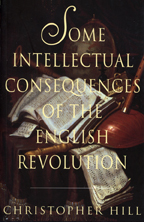|
Some Intellectual Consequences of the English Revolution
Christopher Hill
Curti Lectures
"[Hill’s] subject is the Revolution of 1640–1660 and its effects, but he ranges more generally from the transformations in English society to the latter decades of the seventeenth century as well. . . . [This] is a brief survey of a large subject, but it distills a lifetime of scholarship."—Robert Zaller, History
In Some Intellectual Consequences of the English Revolution, Christopher Hill takes up themes that have emerged from a lifetime’s investigation into the causes of the English Revolution. However, Hill does more than analyze the origins of the Revolution. He examines the ways the seeds of change sown during the revolution, grew into transformative politics in the period following the restoration of the monarchy in 1660.
Hill argues that the intellectual heritage of the English Revolution was mixed. While he acknowledges its achievements, he also depicts some of its failings. Consequently, he challenges the view that radical notions faded with the Restoration, suggesting instead, that they continued in pervasive and subtle ways throughout the course of English and American history. The apparent similarity between the England of 1640 and that of 1660 is shown to be illusory. Each period’s institutions survived but the social context had changed. In this way, Hill demonstrates how intellectual consequences cannot be separated from the social and economic factors of the nation that produced them. He concludes that historians should turn their attention to the “unofficial” radical heritage that is less easy to comprehend, though no less important.
This is a highly readable and provocative account by one of the world’s foremost historians.
Christopher Hill (1912–2003) was master of Balliol College, Oxford. His many books include God’s Englishman, The World Turned Upside Down, and Change and Continuity in Seventeenth-Century England.
Media & bookseller inquiries regarding review copies, events, and interviews can be directed to the publicity department at publicity@uwpress.wisc.edu or (608) 263-0734. (If you want to examine a book for possible course use, please see our Course Books page. If you want to examine a book for possible rights licensing, please see Rights & Permissions.) |
|

August 1980
LC: 79-005408 DA
104 pp. 5 1/2 x 8 1/2
|
